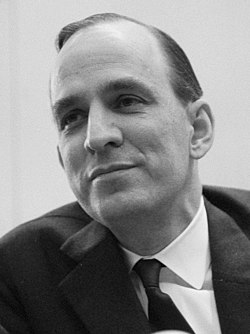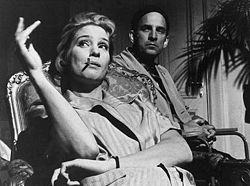Ingmar Bergman
Ernst ![]() Ingmar Bergman (info • help) (IPA: ['ɪŋmar 'bærjman] in Swedish, but usually IPA: [ˈbɝgmən] in English) (14 July 1918 – 30 July 2007)[1] was a Swedish stage and movie director. Ingmar Bergman found bleakness and despair as well as comedy and hope in his indelible explorations of the human condition. He is regarded as one of the great masters of modern cinema.[2]
Ingmar Bergman (info • help) (IPA: ['ɪŋmar 'bærjman] in Swedish, but usually IPA: [ˈbɝgmən] in English) (14 July 1918 – 30 July 2007)[1] was a Swedish stage and movie director. Ingmar Bergman found bleakness and despair as well as comedy and hope in his indelible explorations of the human condition. He is regarded as one of the great masters of modern cinema.[2]
Ingmar Bergman | |
|---|---|
 Bergman in 1966 | |
| Born | Ernst Ingmar Bergman 14 July 1918 |
| Died | 30 July 2007 (aged 89) Fårö, Sweden |
| Other names | Buntel Eriksson |
| Occupation |
|
| Years active | 1944 – 2005 |
| Spouse(s) |
|
| Children | |
| Awards |
|
| Signature | |
 | |
Many filmmakers worldwide, including Americans Woody Allen[3] and Robert Altman,[4] the Russian director Andrei Tarkovsky[5] and the Taiwanese director Ang Lee,[6] have cited the work of Bergman as a major influence on their work.
Biography
Ernst Ingmar Bergman was born in Uppsala, Sweden to a Lutheran minister of Danish descent, Erik Bergman (later chaplain to the King of Sweden), and his wife, Karin (née Åkerblom). He grew up surrounded by religious imagery and discussion. His father was a rather conservative parish minister and strict family father: Ingmar was locked up in dark closets for infractions such as wetting the bed. "While father preached away in the pulpit and the congregation prayed, sang or listened," Ingmar writes in his biography Laterna Magica,
- "I devoted my interest to the church’s mysterious world of low arches, thick walls, the smell of eternity, the colored sunlight quivering above the strangest vegetation of medieval paintings and carved figures on ceilings and walls. There was everything that one’s imagination could desire — angels, saints, dragons, prophets, devils, humans."
He performed two five-month stretches of mandatory military service and studied Art and Literature at Stockholm University College (the later Stockholm University), but without graduating. Instead, he developed an interest in theatre and later in cinema (though he had become a "genuine movie addict"[7] by the early 1930s).
Although he grew up in a devout Lutheran household, Bergman stated that he lost his faith at age eight but came to terms with this fact only when making Winter Light.[8]
From the early sixties, Bergman lived much of his life on the island of Fårö, Gotland, Sweden, where he made a number of his movies. Bergman moved to Munich for a while following a protracted battle with the Swedish government over alleged tax evasion, and did not return to make another movie in Sweden until 1982, when he directed Fanny and Alexander. Bergman said this would be his last movie, and that he would go on to direct theater. Since that time he did make a number of movies for television, but later retired to Fårö, stating in 2004 that he would never again leave the island.
Ingmar Bergman died at his home on Fårö, in the early morning of 30 July 2007, aged 89,[9][10] the same day that another great movie director, Michelangelo Antonioni, died.
Family
Bergman was married five times:
- 25 March 1943 – 1945, to Else Fisher, choreographer and dancer (divorced). Children:
- Lena Bergman, actress, born 1943.
- 22 July 1945 – 1950, to Ellen Lundström, choreographer and movie director (divorced). Children:
- Eva Bergman, movie director, born 1945,
- Jan Bergman, movie director (1946–2000), and
- twins Mats and Anna Bergman, both actors and movie directors and born in 1948.
- 1951 – 1959, to Gun Grut, journalist (divorced). Children:
- Ingmar Bergman Jr, airline captain, born 1951.
- 1959 – 1969, to Käbi Laretei, concert pianist (divorced). Children:
- Daniel Bergman, movie director, born 1962.
- 11 November 1971 – 20 May 1995, to Ingrid von Rosen (maiden name Karlebo) (widowed). Children:
- Maria von Rosen, author, born 1959.
The first four marriages ended in divorce. The last ended when his wife Ingrid died of stomach cancer in 1995, aged 65. Aside from his marriages, Bergman had romantic relationships with actresses Harriet Andersson (1952–55), Bibi Andersson (1955–59), and Liv Ullmann (1965–70). He was the father of writer Linn Ullmann with Liv Ullmann. In all, Bergman had nine children, one of whom died before him.
Awards
Academy Awards
In 1971, Bergman received the Irving G. Thalberg Memorial Award at the Academy Awards ceremony. Three of his films won the Academy Award for Best Foreign Language Film. The list of his nominations and awards:
- Won: Best Foreign Film The Virgin Spring (Jungfrukällan) (1960)[11]
- Won: Best Foreign Film Through a Glass Darkly (Såsom i en spegel) (1961)[12]
- Won: Best Foreign Film Fanny and Alexander (Fanny och Alexander) (1983)
- Nominated: Best Original Screenplay, Wild Strawberries (Smultronstället) (1957)
- Nominated: Best Original Screenplay Through a Glass Darkly (1961)[12]
- Nominated: Best Original Screenplay, Cries and Whispers (Viskningar och rop) (1974)
- Nominated: Best Picture, Cries and Whispers (Viskningar och rop) (1974)
- Nominated: Best Director, Cries and Whispers (Viskningar och rop) (1974)
- Nominated: Best Director, Face to Face (Ansikte mot ansikte) (1977)
- Nominated: Best Original Screenplay, Autumn Sonata (Höstsonaten) (1979)
- Nominated: Best Original Screenplay, Fanny and Alexander (Fanny och Alexander) (1983)
- Nominated: Best Director, Fanny and Alexander (Fanny och Alexander) (1983)
BAFTA Awards
- Nominated: Best Film from any Source, The Magician (Ansiktet) (1960)
- Nominated: Best Foreign Film, Fanny and Alexander (Fanny och Alexander) (1984)
Berlin Film Festival
- Won: Golden Bear for Best Film, Wild Strawberries (Smultronstället) (1957)[13]
- Nominated: Golden Bear for Best Film, Through a Glass Darkly (Såsom i en spegel) (1961)
- Won: OCIC Prize, Through a Glass Darkly (1961)
Cesar Awards
- Nominated: Best Foreign Film, The Magic Flute (Trollflöjten) (1976)
- Nominated: Best Foreign Film, Autumn Sonata (Höstsonaten) (1979)
- Won: Best Foreign Film, Fanny and Alexander (Fanny och Alexander) (1984)
- Nominated: Best European Film, Saraband (2005)
Cannes Film Festival
- Won: Best Poetic Humor Smiles of a Summer Night (Sommarnattens leende) (1955)
- Nominated: Golden Palm Smiles of a Summer Night (Sommarnattens leende) (1955)
- Won: Jury Special prize The Seventh Seal (Det Sjunde inseglet) (1957)
- Nominated: Golden Palm The Seventh Seal (Det Sjunde inseglet) (1957)
- Won: Best Director Brink of Life (Nära livet) (1958)
- Nominated: Golden Palm Brink of Life (Nära livet) (1958)
- Won: Special Mention The Virgin Spring (Jungfrukällan) (1960)
- Nominated: Golden Palm The Virgin Spring (Jungfrukällan) (1960)
- Won: Technical Grand Prize Cries and Whispers (Viskningar och rop) (1972)
- Won: Palm of Palms (1997)
- Won: Prize of the Ecumenical Jury (1998) (Special award for his whole works.)
Golden Globe Awards
- Won: Best Foreign Film Wild Strawberries (Smultronstället) (1960)
- Won: Best Foreign Film The Virgin Spring (1961)
- Won: Best Foreign Film Scenes from a Marriage (1975)
- Won: Best Foreign Film Face to Face (1976)
- Won: Best Foreign Film Autumn Sonata (1978)
- Won: Best Foreign Film Fanny and Alexander (1984)
- Nominated: Best Foreign Film Shame (1968)
- Nominated: Best Foreign Film Cries and Whispers (1973)
Other awards and honors
- Foreign Honorary Member of the American Academy of Arts and Sciences (1961)[14]
- The Dorothy and Lillian Gish Prize (1995)[15]
- BAFTA Academy Fellowship Award (1988)
Ingmar Bergman Media
Bergman and Victor Sjöström on the set of Wild Strawberries (1957)
Bergman with his long-time cinematographer Sven Nykvist during the production of Through a Glass Darkly (1960)
Bergman and actress Ingrid Thulin during the production of The Silence, 1963
A great number of Bergman's interior scenes were filmed at the Filmstaden studios north of Stockholm.
Bergman with fourth wife, Estonian concert pianist Käbi Laretei
Bergman with Norwegian actress Liv Ullmann in 1968. The couple had a daughter, Linn Ullmann, in 1966
A bust of Bergman in Celebrity Alley in Kielce, Poland
References
- ↑ Ingmar Bergman on IMDb
- ↑ "Ingmar Bergman, Famed Director, Dies at 89". New York Times. 30 July 2007. https://www.nytimes.com/2007/07/30/movies/30cnd-bergman.html. Retrieved 2007-07-21. "Ingmar Bergman, the “poet with the camera” who is considered one of the greatest directors in motion picture history, died today on the small island of Faro where he lived on the Baltic coast of Sweden, Astrid Soderbergh Widding, president of The Ingmar Bergman Foundation, said. Bergman was 89.".
- ↑ Corliss, Richard (1 August 2007). "Woody Allen on Ingmar Bergman". Time. http://www.time.com/time/arts/article/0,8599,1648917,00.html?iid=sphere-inline-bottom. Retrieved 23 July 2008.
- ↑ "Robert Altman biography". IMDb. Retrieved 10 January 2008.
- ↑ Le Cain, Maximillian. "Andrei Tarkovsky". Archived from the original on 2010-03-23. Retrieved 2013-05-09.
- ↑ "Ang Lee praises Bergman". Archived from the original on 19 May 2008. Retrieved 22 July 2008.
- ↑ Ingmar Bergman: His Life and Films, by Jerry Vermilye, 2001, p. 6
- ↑ The Films of Ingmar Bergman, by Jesse Kalin, 2003, p. 193
- ↑ ""Bergman välkomnade döden"". Archived from the original on 2007-08-20. Retrieved 2007-07-31.
- ↑ "Film Great Ingmar Bergman Dies at 89". Archived from the original on 2007-09-26. Retrieved 2007-07-31.
- ↑ "The 33rd Academy Awards (1961) Nominees and Winners". oscars.org. Archived from the original on 2014-10-06. Retrieved 2011-10-29.
- ↑ 12.0 12.1 "The 34th Academy Awards (1962) Nominees and Winners". oscars.org. Archived from the original on 2013-12-24. Retrieved 2011-10-29.
- ↑ "Berlinale: Prize Winners". berlinale.de. Archived from the original on 30 August 2019. Retrieved 3 January 2010.
- ↑ "Book of Members, 1780–2010: Chapter B" (PDF). American Academy of Arts and Sciences. Retrieved 16 June 2011.
- ↑ "Gish Prize 1995". Archived from the original on 2012-03-15. Retrieved 2012-06-17.









